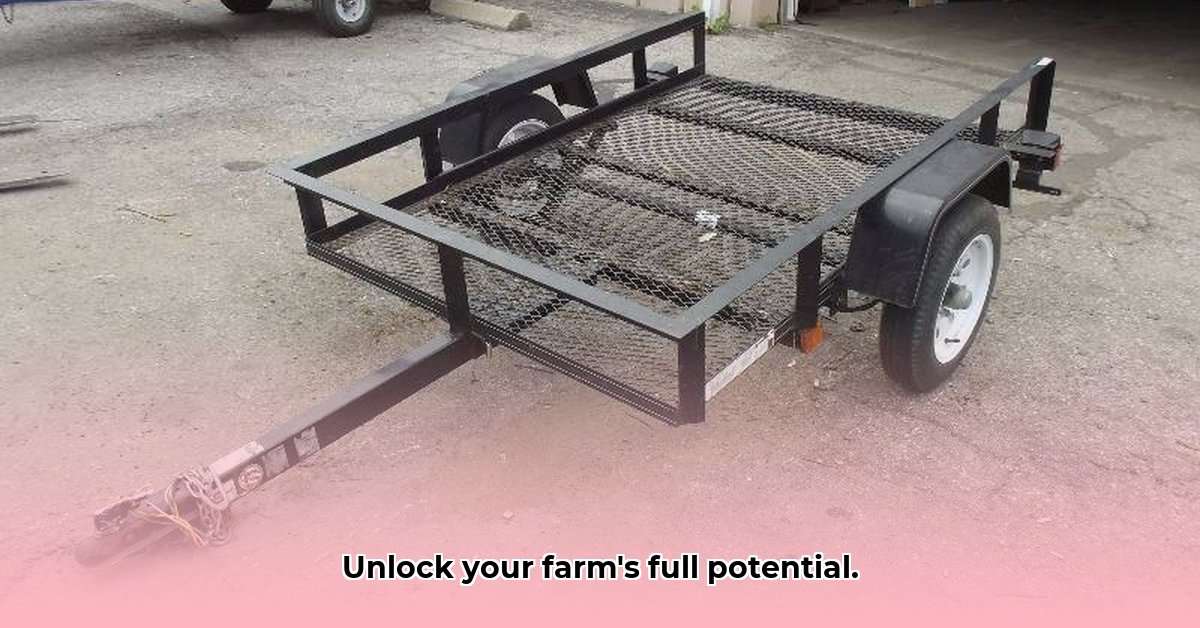
Tractor Supply 4x8 Trailers and Sustainable Farming Practices
Farming today requires balancing productivity with environmental responsibility. Choosing the right equipment, like a reliable trailer, is crucial to achieving both. Tractor Supply offers a range of 4x8 trailers, but selecting the most sustainable option demands careful consideration of various factors. For more details on Tractor Supply's 4x8 trailer options, check out this helpful resource: 4x8 Trailer Guide. This guide explores how to optimize your Tractor Supply 4x8 trailer choice for enhanced efficiency and reduced environmental impact.
Understanding Your Farming Needs
Before selecting a trailer, assess your specific agricultural operations. What types of goods will you transport? Livestock? Harvested crops? Building materials? Will you be making frequent short hauls or less frequent long-distance trips? The answers to these questions will significantly influence your trailer selection. A poorly matched trailer will lead to inefficiency, increased fuel consumption, and a larger carbon footprint. Choosing the right trailer is the first step toward sustainable farming.
Tractor Supply's 4x8 Trailer Lineup
Tractor Supply provides several 4x8 trailer options:
Utility Trailers: Ideal for general-purpose hauling, their sustainability depends heavily on their construction materials and durability. A well-built trailer will last longer, resulting in less waste over its lifespan.
Enclosed Trailers: These protect cargo from weather but require analyzing the materials used for insulation and overall construction. Insulated trailers might offer energy savings when hauling temperature-sensitive items, but the environmental impact of the insulation's production must also be considered.
Livestock Trailers: Animal welfare is paramount. Look for features ensuring animal comfort and safety during transport, including proper ventilation and secure design.
Dump Trailers: Suited for moving bulk materials, their sustainability factors are similar to utility trailers – focusing on materials and longevity. A durable dump trailer will minimize the need for frequent replacements.
Sustainability Analysis: The Need for Transparency
While Tractor Supply offers a variety of trailers, a significant gap exists in the readily available sustainability information. To make informed sustainable choices, more transparent data on the following is needed:
Material Sourcing: Information regarding the origin of materials and the percentage of recycled content used in construction is crucial for assessing the environmental footprint.
Manufacturing Processes: Transparency on energy consumption and waste management practices during manufacturing is necessary to evaluate the overall environmental impact.
Lifecycle Assessment: A comprehensive lifecycle assessment (LCA) of each trailer model would provide a complete picture of its environmental impact, from production to disposal. This is currently missing and represents a key area of needed improvement from Tractor Supply.
Actionable Steps for Sustainable Trailer Selection
Assess Your Needs: Define your hauling needs precisely. This will guide you toward the appropriate trailer type.
Prioritize Durability: Opt for a robustly built trailer with high-quality materials. A longer-lasting trailer minimizes waste and reduces the need for replacements.
Consider Weight: Lighter trailers generally result in better fuel efficiency, reducing your environmental impact during transport.
Research Materials: Inquire about the materials used in the trailer construction. Favor trailers made with recycled content or sustainably sourced materials wherever possible.
Compare Total Cost of Ownership: Account for the initial purchase price, maintenance costs, and fuel consumption over the trailer's lifespan. This holistic approach helps in making a truly informed decision.
Advocate for Transparency: Encourage Tractor Supply to provide more detailed environmental information on their trailers, including LCAs. Your demand for transparency can influence their future sustainability practices.
Risk Assessment and Mitigation
Choosing a durable, appropriately sized trailer minimizes risks associated with frequent replacements, accidents, and damage. Regular maintenance further extends the trailer's lifespan and reduces environmental impact. Thorough pre-purchase research mitigates risks by ensuring your choice aligns with your specific needs and promotes sustainability. For example, overloading a trailer increases the risk of accidents and premature wear. Careful planning and route optimization reduce fuel consumption and emissions.
The Future of Sustainable Agricultural Transport
The agricultural sector is facing increasing regulatory pressure to reduce its environmental impact. Future regulations concerning emissions and material usage will significantly affect trailer selection. Staying abreast of these developments will ensure your farm remains compliant and maintains a sustainable future.
Conclusion: Farming Responsibly
While Tractor Supply offers a range of 4x8 trailers, greater transparency on their sustainability aspects is needed. By prioritizing durability, choosing appropriate materials, and advocating for improved manufacturer transparency, farmers can actively participate in creating a more sustainable agricultural future. Remember, investing in a sustainable trailer isn't just environmentally responsible; it's also a smart, long-term financial decision.